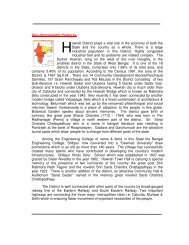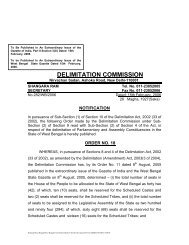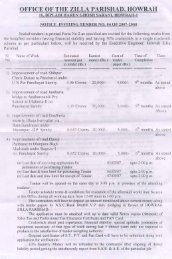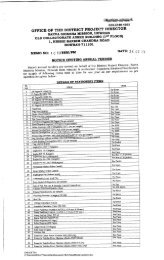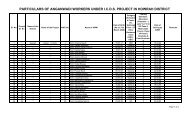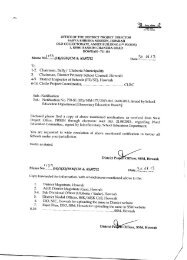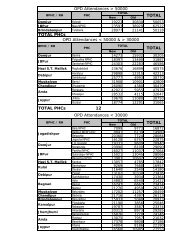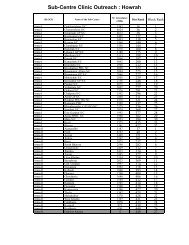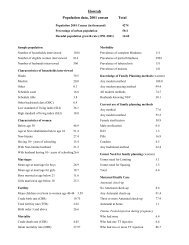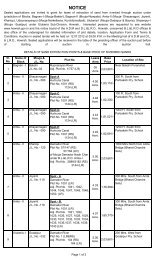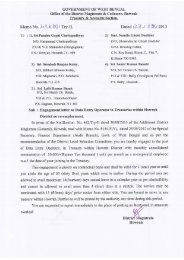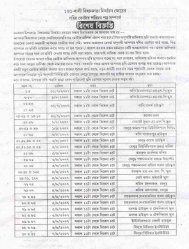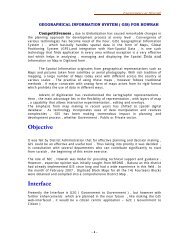SARVA SHIKSHA MISSION
SARVA SHIKSHA MISSION
SARVA SHIKSHA MISSION
Create successful ePaper yourself
Turn your PDF publications into a flip-book with our unique Google optimized e-Paper software.
<strong>SARVA</strong> <strong>SHIKSHA</strong> <strong>MISSION</strong><br />
OBJECTIVES OF SSM<br />
All children to be enrolled in school by 2003<br />
All children to complete four years of primary schooling (class I to IV) by 2006<br />
All children to complete eight years of school (class I to VIII) by 2010<br />
Focus on elementary education of satisfactory quality<br />
Universal retention of all children up to the age of 14 years by 2010<br />
Organizational set up of SSM at the District Level<br />
‣ DISTRICT S.S.M COMMITTEE – The Policy Making Setup<br />
1. Sabhadhipati – Chairman<br />
2. District Magistrate – Executive Vice-Chairman<br />
3. Chairman,DPSC – Vice-Chairman<br />
4. Karmadhyaksha, Siksha Sthayee Samit, HZP - Vice-Chairman<br />
5. DI of Schools (PE) –Member<br />
6. DI of Schools (SE) – Member<br />
7. DNO,SSK – Member<br />
8. DPO,SSM– Member-Secretary<br />
9. Dist. Programme Officer – Member<br />
10. Dist. Mass Education Officer – Member<br />
Other nominated Members<br />
‣ EXECUTIVE SETUP<br />
District Project Director - District Magistrate<br />
District Project Officer Deputy Magistrate<br />
2 Additional District Project Officers A.I of Schools<br />
2 Deputy District Project Officers S.I of Schools<br />
8 nos of Coordinators, 3 nos of Engineers, 8 nos of Clerical Staff and 3 nos of Gr-D staff<br />
155
MAJOR INTERVENTIONS<br />
PEDAGOGY<br />
OBJECTIVE :<br />
• To develop effective Teaching Learning Materials<br />
• To improve competency of teachers for ensuring quality education<br />
• To ensure retention through joyful learning<br />
• Behavioral improvement & development of good qualities in children<br />
• Improvement of quality of learning<br />
STRATEGY :<br />
• To select/form a District Resource Group with educationist, retired teachers, eminent<br />
persons associated with education<br />
• To conduct training on Pedagogical issues for capacity building<br />
• Continuous research works for finding/evolving new approach of teaching & learning<br />
• To study level of learning of children(Baseline Assessment etc.), dropout rate & causes<br />
thereof, transition rate etc.<br />
CIVIL WORKS<br />
Civil Works Include The Following Broad –Based Activities :<br />
• Construction of New School Building (NSB).<br />
• Reconstruction of Dilapidated School Building.<br />
• Construction of Circle Resource Centre (CLRC).<br />
• Construction of Cluster Resource Centre (CRC) .<br />
• Construction of Additional Class Room (ACR).<br />
• Provision of Drinking Water & Toilet Facilities to schools.<br />
ALTERNATIVE SCHOOLING<br />
Centrality of community involvement / management in EGS & AIE interventions<br />
• Conduct of micro planning / house to house survey exercise.<br />
• Planning and locating EGS / AIE centers based on results of micro planning exercise.<br />
• Selection of teacher<br />
156
• Providing space, lighting, drinking water etc. for the learning centres<br />
• Deciding the timing of the centres<br />
• Overseeing the day-to-day running of the centres<br />
• Motivation of parents etc.<br />
• Payment of honorarium to the teacher<br />
• Purchase of teaching-learning material and equipment for the centre.<br />
•<br />
GIRLS’ EDUCATION<br />
The primary objective of UEE being universal enrolment, retention, imparting quality education<br />
& abolition of gender discrimination, problem of retention is becoming one of the major<br />
problem in abolition of gender discrimination. The following activities may be taken up for<br />
eradicating the bottle-necks :<br />
• Separate toilet facility for girls through School Sanitation Programme<br />
• Awareness campaign where girls attendance is poor<br />
• Changing the attitude of teachers towards girl child in the class room<br />
• Orientation of Resource Persons on girls’ education at district level & CLRC level<br />
• Orientation of Panchayat/ULB functionaries<br />
• Orientation of VEC/WEC members, MC members of SSK, MTA members etc.<br />
• Sensitization of teachers on girls’ education<br />
• Workshop with RPs on development of slogans, posters etc.<br />
• Observation of World Women’s Day<br />
INTEGRATED EDUCATION FOR THE DISABLED<br />
Universalisation of elementary education shall remain incomplete if disabled children are not<br />
included under the preview of the programme with proper care. The main objective of IED<br />
programme is to evolve, demonstrate, evaluate and documentation of strategies that<br />
facilitate UEE for children with disabilities.<br />
INNOVATION<br />
Innovation being a continuous process, experiments are required to be made regularly so that<br />
new district specific, area specific and action oriented research may be undertaken.<br />
• Special health check-up programme for the children in primary and upper<br />
primary schools.<br />
• Computer education in upper primary schools.<br />
• Text Book Grant for girls and students of SC/ST community in UP schools.<br />
157
• Exposure visit of District Team to take stock of different innovation activities<br />
taken up by other State / District.<br />
PLANNING, RESEARCH & STUDIES, MONITORING AND MANAGEMENT<br />
INFORMATION SYSTEM<br />
Planning is an important instrument of a management system for implementation of any<br />
programme. The following activities are being undertaken for collection of information and<br />
preparation of need based plan :-<br />
• Micro – planning ( Habitation Planning)<br />
• School Photography & Survey<br />
• School Cholo Karmasuchi & House – to – House Survey.<br />
• School Readiness Programme for Primary Schools ( assessment of underaged<br />
students )<br />
• Upper Primary Database Development ( including school photography)<br />
• Base – line survey of upper primary schools.<br />
• DISE Survey<br />
• Preparation of Annual Work Plan & Budget<br />
RESEARCH & STUDIES<br />
• Since the objective of SSM is to open the door of elementary education to each eligible<br />
child as well as to check the drop out from schools and to provide them with quality<br />
education, it requires continuous scrutiny and evaluation of plans as well as formulating<br />
policies and solution of specific problems of the district.<br />
• For this proper importance need to be attach to Research and Studies.<br />
2) INSPECTION REPORT FOR 2006-07<br />
No inspection was done in 2006-07.<br />
3) LAST YEAR’S INSPECTION REPORT AND FOLLOW UP ACTION<br />
NIL<br />
4) MAINTENANCE OF GUARD FILE :<br />
158
Guard File maintained properly by this Section. Normally guideline received from State<br />
Project Office and various departments regarding administrative matter is maintained<br />
centrally and Interventionwise guard file maintained by the concerned Coordinator.<br />
5) E-Governance and Computerisation :<br />
‣ Implemented a computerized Database of all the Primary & Upper Primary Schools of<br />
this District.<br />
‣ The database is used to generate different types of reports on Physical Infrastructure,<br />
Teacher Details, Enrolment Details etc. of all the above schools, which are used to make<br />
different strategies and to use different types of grants.<br />
‣ The database updated every year for all the schools.<br />
‣ Implemented a computerized database containing account details of all the Schools /<br />
VEC/WECs of this district. The database updates regularly and used to release all the<br />
grants release from this office.<br />
‣ The department is totally computerized and all the computers are connected through<br />
intranet for sharing data with each other.<br />
‣ Using Internet – E-mailing facility this department share different types of reports etc.<br />
with the State Office / other Government Office like Blocks.<br />
6) STAFF TRAINING<br />
SL.NO. Sub-Activity details Ph<br />
1 Research Co-ordinator<br />
2 Co-ordinator for children with<br />
special needs<br />
3 MIS-in-Charge<br />
RECEIVED<br />
DISTRICT<br />
LEVEL<br />
GENERAL<br />
TRAINIG<br />
(y/n)<br />
RECEIVED<br />
COMPUTER<br />
TRAINING<br />
1 N Yes<br />
1 N<br />
1 N<br />
4 PMIS Co-ordinator 1 N Yes<br />
5 Pedagogy Co-ordinator 1 N Yes<br />
6 Co-ordinator for CM & AS 1 N Yes<br />
7 DSTM 2 N N.A.<br />
8 Programme Coordinator<br />
Yes<br />
1 N<br />
(Pedagogy)<br />
9 DEO 2 N Yes<br />
10 Accountant 1 N Yes<br />
11 UDA (Cash) 1 N Yes<br />
12 UDA(General) 1 N Yes<br />
Yes<br />
Yes<br />
159
13 Technical Asst. 1 N No<br />
14 Gr. 'D' Staff (peon/Night<br />
No<br />
2 N<br />
Guard)<br />
15 Field Jr. Engineer 8 N N.A.<br />
16 Gr.C staff in CLRCs 27 Y Yes<br />
7) INNOVATION IF ANY IN LAST YEAR 2006-07<br />
Cohort Study<br />
Cohort Study in school both primary and upper primary is conducting to find the following points.<br />
‣ Promotion rate at each grade under Primary and Upper Primary Education.<br />
‣ The percentage of students completing primary (I-IV) education and upper primary (V-<br />
VIII) and retained in school.<br />
‣ Percentage of students dropped out within the period studies i.e. 5 years.<br />
‣ Gender and social equity on the above issue.<br />
‣ Other related issues.<br />
‣ In the previous year this Cohort Study (Primary) has been contemplated basically as a<br />
Baseline Study. Children admitted in grade-I in 2000-2001 have been taken up as the<br />
starting Cohort. The proposed study has been based on surveys conducted in all<br />
primary schools of Howrah district. The objectives of the present study have been<br />
formulated as follows :<br />
1) To estimate completion rate over the four years of primary education cycle for 2000-01<br />
grade I children who have been completed gradually grade IV in the year 2004-2005.<br />
2) To estimate Cohort dropout and repetition rates.<br />
3) To assess gender and social gaps in completion, dropout and repetition rates.<br />
The study does not attempt to ascertain the learning outcome of those children who are<br />
able to successfully complete the primary education cycle in four years.<br />
160
8) CASE STUDY/SUCCESS STORY :<br />
Annual Administrative Report- 2006-2007 (vide memo no. 323 (50|)/RG dtd. 11/04/2007,<br />
from District Magistrate, Howrah.<br />
Alternative Schooling<br />
There are several habitations in the District which are still out of the coverage of formal<br />
primary education. There may be many such areas where formal primary school cannot be set<br />
up as per Govt. norms. Such areas are supposed to be provided with Alternative schools. In<br />
addition to this, alternative schools are also required for those categories of children for whom<br />
participating in formal schools may not be possible for various reasons.<br />
Sishu Shiksha Karmasuchi / Madhyamik Shiksha Karmasuchi : - Alternative schooling<br />
system operates its activities under Alternative Schooling sector with the SSK of the Govt in the<br />
P&RD department. Pedagogical training to the SSS of SSK on teaching learning method,<br />
development and use of TLM, handling large size classroom to multi-grade teachings, etc.,<br />
Orientation / Training / Sensitization of functionaries of management committees of SSK, VEC<br />
members, Panchayat functionaries, providing regular academic support to the SSKs, and<br />
Shishu Shiksha Sahayika through CLRCs, providing school grant to SSK and TLM grant to<br />
Shikhsa Sahayikas.<br />
Bridge Course Study Centre : - As per provision for opening of formal / non-formal new<br />
schools in State norms or for setting up of EGS / AIE like schools in unserved habitations, we<br />
have opened 107 study centres with 2576 learners in the year 2006-2007. The evaluation<br />
process of 50 centres with 1253 learners will be examined last week of May’2007 and the<br />
mainstreamed process of those children is already started in block level.<br />
Bridge Course study centres in Hindi & Urdu medium have been started at Bally<br />
Municipality and Howrah Municipal Corporation area with 500 students from March’2006.<br />
9) AUDIT PARAS/COMPLIANCE<br />
Replies to Auditors’ Report, on SSA, Howrah for the year 2005-06.<br />
Reply to the Auditors’ Report on the Sarva Shiksha Abhiyan, Howrah, for the Financial Year<br />
2005-06, as submitted by M/s C. Ghosh & Co. of 8/2, K.S. Roy Road, Kolkata-1 and forwarded<br />
by the State Project Office.<br />
Page No. Subject / Item Reply to the Para wise Auditors’ Report dt.27.10.06.<br />
1 “Page Authorisation Noted; Required certificates have been obtained from<br />
Certificate” required in the District Project Officer, SSA, Howrah<br />
Cash Book and in ledgers<br />
2 Alterations, overwriting and<br />
use of white ink have been<br />
made in Cash Book<br />
Noted; So far made in 2005-06 have been authorized<br />
by the signature of District Project Officer, SSA,<br />
Howrah<br />
161
3 Entries in the Cash Book<br />
account was without<br />
detailed narration<br />
4 Advances made to certain<br />
bodies/parties to wards<br />
IEC, IEDC, B/L/SL Grant<br />
has not supporting or fund<br />
utilization details.<br />
5 No control over the<br />
advances given specially<br />
for the Civil Works and no<br />
records of the old UCs<br />
6 UCs regarding the other<br />
interventions is also not<br />
collected promptly.<br />
Sub-activity codes for each transaction are mentioned<br />
in the Cash Book from which the types of transactions<br />
can be ascertained easily; Respective vouchers are<br />
available always.<br />
Advances were made as per direction from the State<br />
Project Office and also the School Education Deptt.<br />
from time to time.<br />
Placement of fund is made for particular purpose; on<br />
the requisition of the payee concern as per<br />
administrative approval from time to time.<br />
Relevant files with approval, correspondences, etc. for<br />
adjustments of those funds, list of adjustments, will be<br />
shown to the next Auditor.<br />
No. Any fund so far placed with the VECs/WECs /<br />
Managing Committees etc. are made through A/c<br />
Payee cheques / through the Banker, direct to the<br />
respective bank accounts, by transfer credit system<br />
since beginning of the project.<br />
Different officers are entrusted to monitor the Civil<br />
Works at different schools both primary and upper<br />
primary schools;<br />
Income and expenditure position/transactions are<br />
placed in the meeting of VECs, WECs of primary<br />
schools and of managing committees of upper primary<br />
schools for approval after scrutiny.<br />
The officers inspect the books of accounts, supervise<br />
the work of VECs/WECs/ Managing Committees<br />
regularly.<br />
By this time a considerable number of old pending<br />
UCs and statement of expenditures have been<br />
collected by special drive and those are being sorted<br />
out and arranged at this office<br />
Those will be shown to the next Auditor.<br />
After taking a special drive, a considerable number of<br />
UCs against the other interventions have been<br />
collected by this office;<br />
Those are being sorted out, arranged at this office and<br />
those will be shown to the next Auditor.<br />
10) ADJUSTMENT OF ADVANCE<br />
This office has no transaction with Treasury. No advance thus has to be adjusted.<br />
11-12) MAINTENANCE OF WORK DIARY BY STAFF & SPECIAL REMARKS<br />
IF ANY<br />
The Sarva Shiksha Mission (SSM) runs in a project mode where more or less all the<br />
activities are done following an yearly calendar which is guided by the yearly academic calendar<br />
of the Primary and Upper Primary Education System of the District. The Coordinators<br />
coordinate the intervention-wise activities which are monthly monitored by the State Project<br />
162
Office Here is a specific tour report proforma directed by the State Project Office (As enclosed)<br />
which is followed by all the coordinators when they visit schools and which is the main focus<br />
point of most of the tours of the coordinators.<br />
Within the District Set up Weekly Review Meeting is organized on every Friday under the<br />
Chairmanship of the Addl District Magistrate where the progress is evaluated and future action<br />
is resolved.<br />
Moreover, the District SSM Committee under the Chairmanship of the Sabhadhipati<br />
quarterly meets and guides the project office and monitors the activities.<br />
163



